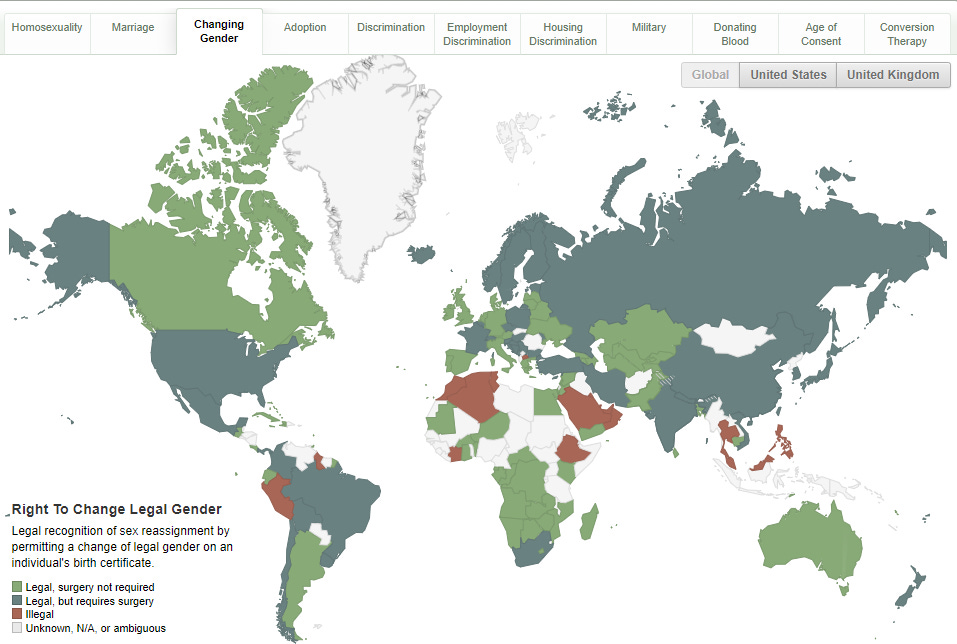In the Senate confirmation hearings of U.S. Supreme Court nominee Ketanji Brown Jackson a few weeks ago, Jackson was was asked (in the video clip above) by Sen. Marsha Blackburn (R-TN) to define the word "woman." Jackson did not take the opportunity, explaining that she was not a biologist. Senator Blackburn opined that the exchange highlighted the “dangers of a progressive education.”
Asking politicians and others who support the rights of trans individuals to define “woman” has quickly spread among those on the political right, and is suggested to be some sort of “gotcha” question. Check out the clip below from Sky News Australia, in which the news reader assuredly opines that the definition of woman “is pretty simple, black and white.” She is right about that, but wrong in the substance.
Here is how I’d answer the question of “what is a woman?” — coming from someone who is currently studying the regulation of trans individuals in sport, and with expertise is how science is and is not connected to policy. Of note, I’m not a biologist either, but I do know what a woman is.
So, what is a woman?
A woman is an individual who was assigned female at birth and has maintained that status until today.
A woman also is an individual who was not assigned female at birth, but transitioned to a woman at some point before today.
That’s it. That’s the definition of a woman.
Senator Blackburn in the U.S. or Senator Antic in Australia do not have to like this definition, and they may prefer another. But wishes do not change reality. The map below (from Equaldex) shows the recent status of laws in different countries giving individuals the right to change genders. Across jurisdictions laws vary in their details, of course, but what is undeniable is who is a woman.
In this way, the question of “what is a woman?” parallels the question, “what is an American?” The answer is that an American is a citizen by birth or naturalization — that’s it, that’s the definition. No one need like that definition, and may prefer to speak of “real Americans” as a subset of actual Americans. All that sort of denial does is to reflect the biases, prejudices and sometimes even bigotry of those offering a definition at odds with reality.
The idea that we can look to science as an authority that rests above law and policy is evident in both cases of the Senators apparent efforts to deny the laws of their own countries. In defining a “woman,” I fully understand that some may prefer essentialist arguments focused on chromosomes, ovaries, giving birth or the like, but in actual fact, most of the world has decided to go in a different direction. Of course, that simply sets the stage for those on the losing end to try to use the issue to inflame passions for political gain, and in the process, create considerable harm to real people.
The ongoing battle over recognition of trans women in sport is simply mirrors a larger culture war, in which some (typically, but not always, on the far right) wish to deny the actual existence of trans women as women as a way to protest the reality of existing laws. It is part of the outrage playbook so common in our time.
My reply to these folks? Get over it. Trans women are in fact women.
Paying subscribers to The Honest Broker receive posts with pointers to recommended readings, occasional direct emails with PDFs of my books and paywalled writings and the opportunity to participate in conversations on the site. I am also looking for ways to add value to those who see fit to support my work.
There are three subscription models:
1. The annual subscription: $80 annually
2. The standard monthly subscription: $8 monthly - which gives you a bit more flexibility.
3. Founders club: $500 annually, or another amount at your discretion - for those who have the ability or interest to support my work at a higher level.





I have always liked and appreciated your information on climate. Respectfully, then, I find your views on this topic to be ill-considered.
First, you cannot logically claim "trans women are *in fact* women" while also denying the term "woman" has any objective meaning. You eschew "essentialist arguments focused on chromosomes, ovaries, giving birth or the like" -- i.e., any facts that we might use to determine a person's sex. This means, for you, who is a woman is subjective. Therefore, your statement should be: "In my opinion, trans women are women."
Second, you cannot use a synonym for the word being defined as part of its definition. Your answer to the "what is a woman?" question amounts to 'a woman is an individual who was assigned woman at birth or transitioned to a woman.' (I know babies aren't technically "women," but absent the essentialist definitions you eschew, "female" becomes a synonym in this case.) Or in summary, you're saying: A woman is a woman.
Finally, it's a bit hypocritical to claim "wishes do not change reality" and deride those fueling a culture war while at the same time repeating non-reality based talking points from one side of that culture war. For instance, the idea that sex is "assigned" at birth comes from supporters of the trans agenda. Babies are *determined* to be male or female at birth. But assigned? What does that even mean? Are you claiming doctors arbitrarily determine a baby's sex? Or do they really use science?
Also: A person cannot *transition* to being a woman -- at least not yet. For that, we would need the ability to download our brains into other bodies like in certain SF movies. Today, men can change their dress, their hair and parts of their bodies to be woman-like in several ways. But that doesn't make them women based on any coherent definition of the word. Why not leave it at "trans-woman" and simply argue that such people should have the same rights as natural women? Then we can move on to debating whether trans-women should be allowed to enter spaces and sports specifically reserved for natural women. Or whether we should be encouraging minors to permanently damage their reproductive systems to become trans.
Finally, you may want to reconsider smearing your readers who hold the views above as "far right" or "typically far right." That's a slur. It's ugly tribalism. Even though it seems you are captured by a quite radical leftist idea on this particular topic, I wouldn't smear you as "far left." Please reconsider your labels.
This reminds me of the old adage, "All golden retrievers are dogs but not all dogs are golden retrievers." Using nationality as a comparison to a biological fact is just a straw-man argument.
Let's say a black child says one day to her mother, 'I'm white. Get over it. I may look black, but I feel white inside." A chapter head for the NAACP tried that and was summarily booted from her position when they found out she was a pure-bred white girl who constantly tanned and dressed as a black woman. She was still white though. She claimed she felt like a black person. Using your logic, who cares? Let her be what she wants.
You're hanging your argument on semantics. Claiming only you can define what a woman is a perfect example of hubris. And why do liberals always resort to impassioned pleas that not accepting trans-orthodoxy will inflame passions and cause harm? From where I sit, it's folks like you who are causing harm by indulging in these ridiculous fantasies.
The correct definition is a woman is a person who has two X chromosomes. Period. Until you have a child come to you and say she or he wants to be another gender, you shouldn't even be involved in this discussion. This is a boutique issue largely among guilty white liberals who surprisingly aren't transgendered. That's because this sub-community makes up a tiny fraction of the population. Just because they hitched their wagon to the LGB community doesn't make it any more authentic. LGB is about who you want to have sex with. Being trans is about what sex you want to be.
And most of the world has NOT gone in a different direction. Elites and the media may have, but poll after poll shows you are the one going in a different direction. A white liberal from Boulder, Colo. You have zero street cred. Should we treat all people with respect and dignity? Yes. Should we deny science for larger political goals? Never.